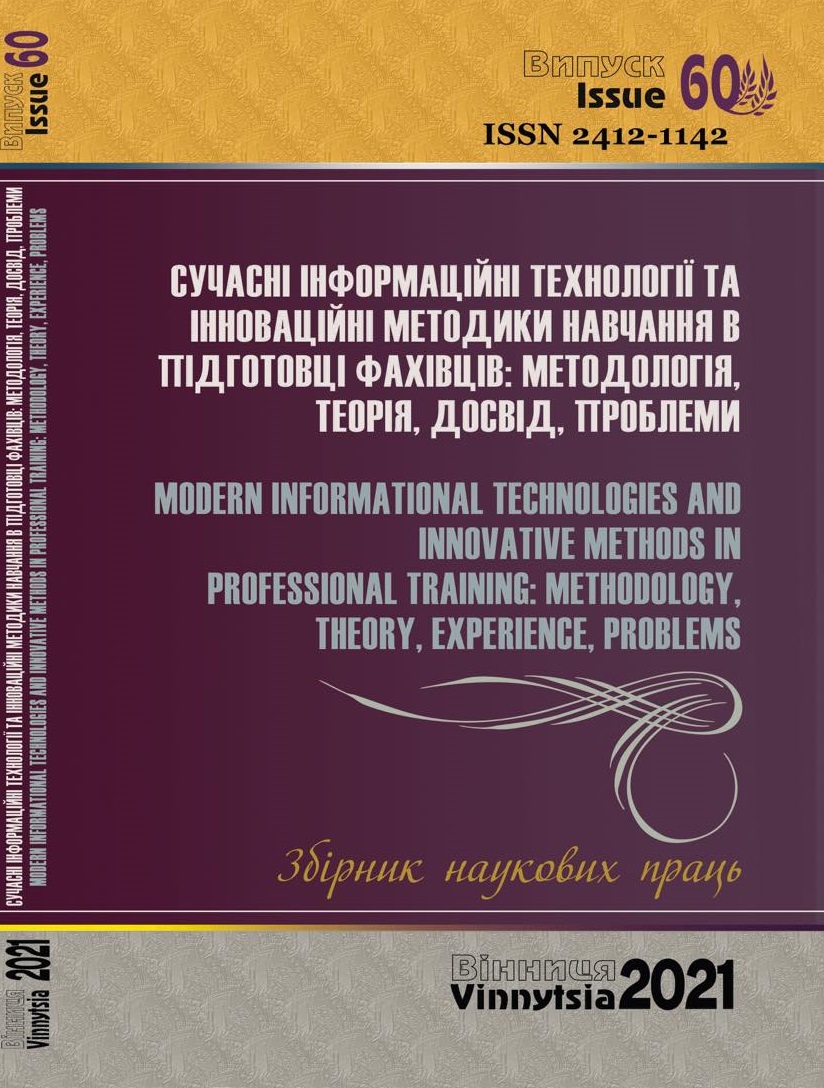DISTANCE COURSES COMPETITION
DOI:
https://doi.org/10.31652/2412-1142-2021-60-69-80Keywords:
e-learning; distance course; expert; competition; criteriaAbstract
During the pandemic, the number of teachers who created distance learning courses increased
by almost an order of magnitude. As a result, they are all different, not all meet the standards of the
educational institution (provided that the latter is available). Therefore, there is an urgent need to teach a
large number of teachers to create quality distance learning courses. Distance course competitions can be a
demonstration of quality samples. To conduct the competition, it is necessary to choose the standard of the
distance course, prepare questionnaires for the selection of the best samples, determine the experts of
distance learning and develop criteria for evaluating these courses.
Criteria for evaluating distance learning courses were used on the recommendation of the Academic Senate
of California Public Colleges. The biggest problem in preparing for the competition was the choice of
experts. There were not enough people trained in the open distance courses of KhNAHU for the successful
holding of the competition, the universities recommended practitioners with insufficient theoretical
training. In addition, their low motivation did not contribute to the successful conduct of a distance training
course.
The purpose of the study is to determine the general level of distance learning courses, to identify design
problems, to analyze the activities of the expert during the examination of the distance learning course at
the request of its owner and to determine the training program of the expert.
39 courses took part in the open competition of distance courses: KhNAHU - 28 courses, ITV NTU "KhPI"
3 courses, NIU "KhPI" - 1 course, NUPh - 3 courses, MSU - 2 courses, KhNEU named after Kuznets - 2
courses. An expert questionnaire was used to conduct the selection, which allowed to divide the participants
into three groups.
In the courses submitted to the competition there is almost no group work, creative tasks and entrance
control - 8%, poorly used video - 29%, dating forum - 34%, glossary - 36%, vaguely defined criteria for
evaluating practical classes - 36%. The weak link in all distance courses is the support of students (25.7%),
there are almost no rules of etiquette in discussions and other types of communication (27.6%). The best
distance courses were NTU "KhPI" and NUPh The analysis showed that during quarantine it is necessary to have a supportive distance course in the
school. The system of training experts should be based on the competencies of the ISTE standard and
consist of three courses: development of a distance course, a tutor's workshop and an expert's practical
course.
Downloads
References
Jesse Stommel. Counter-friction to Stop the Machine: The Endgame for Instructional Design URL:
https://hybridpedagogy.org/the-endgame-for-instructional-design/ (дата звернення 10.09.2021)
Rhea Kelly. 6 Key Technologies Moving Teaching and Learning Forward in 2021. 26.04.2021, URL:
in-2021.aspx?admgarea=news (дата звернення 10.09.2021)
Tom Kuhlmann Why There Are So Many Bad E-Learning Courses URL: https://blogs.articulate.com/rapid-
elearning/why-there-are-so-many-bad-e-learning-courses/ (дата звернення 10.09.2021)
California Community College Online Education Initiative - Course Exchange URL:
звернення 10.09.2021)
Kelvin Thompson. Quality Assurance in Blended Learning. URL: https://blended.online.ucf.edu/blendkit-course-
blendkit-reader-chapter-5/ (дата звернення 10.09.2021)
Online Course Design Standards URL: https://cvc.edu/professional-development/online-course-design-standards/
(дата звернення 10.09.2021)
5 Principles for Quality Online Teaching URL: https://cvc.edu/wp-content/uploads/2018/11/@ONE-
Principles.pdf (дата звернення 10.09.2021)
Туккель И.Л., Голубев С.А., Сурина А.В. и др. Методы и инструменты управления инновационным
развитием промышленных предприятий /Под ред. Теккеля И.Л. – СПб: ВХВ-Петербург, 2013 – 208 с
Clark Quinn Deep learning and expertise URL: https://blog.learnlets.com/2021/04/deep-learning-and-expertise/
(дата звернення 10.09.2021)
Deborah Arnold, Albert Sangrà. Dawn or dusk of the 5th age of research in educational technology? A literature
review on (e-) leadership for technology-enhanced learning in higher education (2013-2017). International Journal
of Educational Technology in Higher Education volume 15, Article number: 24 (2018) URL:
https://educationaltechnologyjournal.springeropen.com/articles/10.1186/s41239-018-0104-3 (дата звернення 10.09.2021)
Apoorve Dubey This is what great leadership looks like in the digital age URL:
https://www.weforum.org/agenda/2019/04/leadership-digital-age-leader/ (дата звернення 10.09.2021)
Pedagogical Training Of Learning Engineer. Відкрите освітнєе-середовище сучасного університету Special
Edition “New pedagogical approaches in STEAM education” URL: https://doi.org/10.28925/2414-0325.2019s15
(дата звернення 10.09.2021)
Specific Review Standards from the QM Higher Education Rubric, Sixth Edition URL:
https://www.qualitymatters.org/sites/default/files/PDFs/StandardsfromtheQMHigherEducationRubric.pdf (дата
звернення 10.09.2021)
Downloads
Published
Issue
Section
License
Copyright (c) 2021 Володимир Кухаренко

This work is licensed under a Creative Commons Attribution 4.0 International License.

